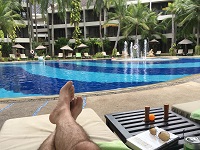JLang, I believe there is benefit: To start
Post# of 157751
I believe there is benefit:
To start with we should have had the protocol tailored to some of the KNOWN results (being these Patterson's or somebody else's). Can't speak to the affinity of the PE's to the current research status in COVID.
But in Dr. Kelly's words this is an exploratory trial.
There are institutions and physicians that have been studying this condition for months now. We haven't because we don't have a research facility.
Clinical trials are a good way to find data BUT a very time-consuming and expensive one. We don't have either the time or the money.
My point is simply: A trial should be used to probe already-understood science. Not as part of Science-discovery process. More so when one is a small company with no revenue.
Or, in another words: exploratory trials are nice, they give lots of information but there are more efficient ways of finding out what works out or not BEFORE attempting a trial. More so in such a complex condition (some info below).
https://www.ncbi.nlm.nih.gov/pmc/articles/PMC7539940/
https://www.bmj.com/content/370/bmj.m3026
https://www.bmj.com/content/370/bmj.m3489
https://www.medrxiv.org/content/10.1101/2020....20248802v2
Quote:
Results Prevalence of 205 symptoms in 10 organ systems was estimated in this cohort, with 66 symptoms traced over seven months. Respondents experienced symptoms in an average of 9.08 (95% confidence interval 9.04 to 9.13) organ systems. The most frequent symptoms reported after month 6 were: fatigue (77.7%, 74.9% to 80.3%), post-exertional malaise (72.2%, 69.3% to 75.0%), and cognitive dysfunction (55.4%, 52.4% to 58.8%). These three symptoms were also the three most commonly reported overall. In those who recovered in less than 90 days, the average number of symptoms peaked at week 2 (11.4, 9.4 to 13.6), and in those who did not recover in 90 days, the average number of symptoms peaked at month 2 (17.2, 16.5 to 17.. Respondents with symptoms over 6 months experienced an average of 13.8 (12.7 to 14.9) symptoms in month 7. 85.9% (84.8% to 87.0%) experienced relapses, with exercise, physical or mental activity, and stress as the main triggers. 86.7% (85.6% to 92.5%) of unrecovered respondents were experiencing fatigue at the time of survey, compared to 44.7% (38.5% to 50.5%) of recovered respondents. 45.2% (42.9% to 47.2%) reported requiring a reduced work schedule compared to pre-illness and 22.3% (20.5% to 24.3%) were not working at the time of survey due to their health conditions.
I am not proposing to change the protocol. I propose to start working in designing P3 integrating the experiences of more advanced researchers, with the data we will be obtaining and in alliance with other companies/drug(s).
I pose it to you: every patient that Dr. Patterson or any other physician has treated with measurements (severity score, Long Hauler Score) is a little trial on it own and that information (over 100's of patients) should be incorporated into any responsible trial design.
Are we. Have we ???
We all want the best for CYDY and I believe LL is an excellent drug !!!. But, let me ask you the following question: Do you think LL ALONE will be effective in LH treatment (Prevalence of 205 symptoms in 10 organ systems was estimated in this cohort as per one of the papers above)???
I surely would hope so. But, I repeat, I think the solution is a combination of drugs.
We need to be part of that combination.
The above for LH trial. CD-16 & CD-17 are different "animals" as we demonstrated benefit in Critical patients.
 (14)
(14) (0)
(0)